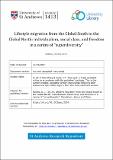Lifestyle migration from the Global South to the Global North : individualism, social class, and freedom in a centre of "superdiversity"
Abstract
Lifestyle migration is a growing field of interest. Traditionally, research into lifestyle migration has focused on either “North to North” or “North to South” migration. This article analyses middle‐class Brazilian migration to London together with examples from the lifestyle migration literature to argue that there are instances of movement from the Global South to the Global North, which should be classified as lifestyle migration according to how the term is used in the literature. This is important because there is a tendency in migration studies to implicitly classify all voluntary migration from South to North as “economic.” The article compares the similarities in terms of motivations to migrate and identity as a migrant, between “lifestyle migrants” as characterised in the literature and many Brazilian middle‐class migrants to London. Rather than economic gain, individualist ideals of anonymity and mobility are often central in the discourse. Mobility is conceived not only as mobility across space but also in terms of mobility of identity, specifically as a disavowal of a transnational identity in favour of a more individualistic ideological stance. The article goes on to examine how the dichotomy between lifestyle and economic migrants is operationalised within the discourse of middle‐class Brazilian migrants to demarcate their situation from their “transnational” compatriots who they view as “other.” This act of distancing themselves from the “typical migrant” and often from Brazilian “culture” more generally is often stratified by class and race. Distancing becomes especially important in cases when differences may not be so apparent to an outside observer. The article ultimately argues for an understanding of lifestyle migration that incorporates movements from South to North and thus for a greater emphasis on social class, which, in the context of Brazil, is bound up with issues of racial and ethnic identity.
Citation
Robins , D 2019 , ' Lifestyle migration from the Global South to the Global North : individualism, social class, and freedom in a centre of "superdiversity" ' , Population, Space and Place , vol. 25 , no. 6 , e2236 . https://doi.org/10.1002/psp.2236
Publication
Population, Space and Place
Status
Peer reviewed
ISSN
1544-8444Type
Journal article
Description
Funding: St Andrews’ Janet T Anderson Scholarship.Collections
Items in the St Andrews Research Repository are protected by copyright, with all rights reserved, unless otherwise indicated.

